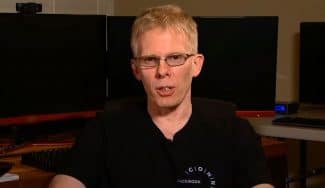John Carmack left his role as “executive consultant” for virtual reality at Meta.
Carmack occupied key roles over the last decade in pushing forward VR’s path toward consumer adoption, from exchanging hardware with Rift creator Palmer Luckey to becoming CTO at Oculus and continuing to work at Facebook and then Meta. His annual talks at Oculus/Facebook/Meta Connect offered some of the deepest technical analysis of VR’s ongoing pain points and areas for improvement.
Below is embedded one of Carmack’s 2012 interviews from E3 which helped jumpstart talk of VR’s path toward consumer adoption. Following the video is Carmack’s full note he published on Facebook marking “the end of my decade in VR” as he goes “all in on building” artificial general intelligence at his new startup, Keen Technologies.
John Carmack’s departing note from Meta:
I resigned from my position as an executive consultant for VR with Meta. My internal post to the company got leaked to the press, but that just results in them picking a few choice bits out of it. Here is the full post, just as the internal employees saw it:
————-
This is the end of my decade in VR.
I have mixed feelings.
Quest 2 is almost exactly what I wanted to see from the beginning – mobile hardware, inside out tracking, optional PC streaming, 4k (ish) screen, cost effective. Despite all the complaints I have about our software, millions of people are still getting value out of it. We have a good product. It is successful, and successful products make the world a better place. It all could have happened a bit faster and been going better if different decisions had been made, but we built something pretty close to The Right Thing.
The issue is our efficiency.
Some will ask why I care how the progress is happening, as long as it is happening?
If I am trying to sway others, I would say that an org that has only known inefficiency is ill prepared for the inevitable competition and/or belt tightening, but really, it is the more personal pain of seeing a 5% GPU utilization number in production. I am offended by it.
[edit: I was being overly poetic here, as several people have missed the intention. As a systems optimization person, I care deeply about efficiency. When you work hard at optimization for most of your life, seeing something that is grossly inefficient hurts your soul. I was likening observing our organization’s performance to seeing a tragically low number on a profiling tool.]
We have a ridiculous amount of people and resources, but we constantly self-sabotage and squander effort. There is no way to sugar coat this; I think our organization is operating at half the effectiveness that would make me happy. Some may scoff and contend we are doing just fine, but others will laugh and say “Half? Ha! I’m at quarter efficiency!”
It has been a struggle for me. I have a voice at the highest levels here, so it feels like I should be able to move things, but I’m evidently not persuasive enough. A good fraction of the things I complain about eventually turn my way after a year or two passes and evidence piles up, but I have never been able to kill stupid things before they cause damage, or set a direction and have a team actually stick to it. I think my influence at the margins has been positive, but it has never been a prime mover.
This was admittedly self-inflicted – I could have moved to Menlo Park after the Oculus acquisition and tried to wage battles with generations of leadership, but I was busy programming, and I assumed I would hate it, be bad at it, and probably lose anyway.
Enough complaining. I wearied of the fight and have my own startup to run, but the fight is still winnable! VR can bring value to most of the people in the world, and no company is better positioned to do it than Meta. Maybe it actually is possible to get there by just plowing ahead with current practices, but there is plenty of room for improvement.
Make better decisions and fill your products with “Give a Damn”!





